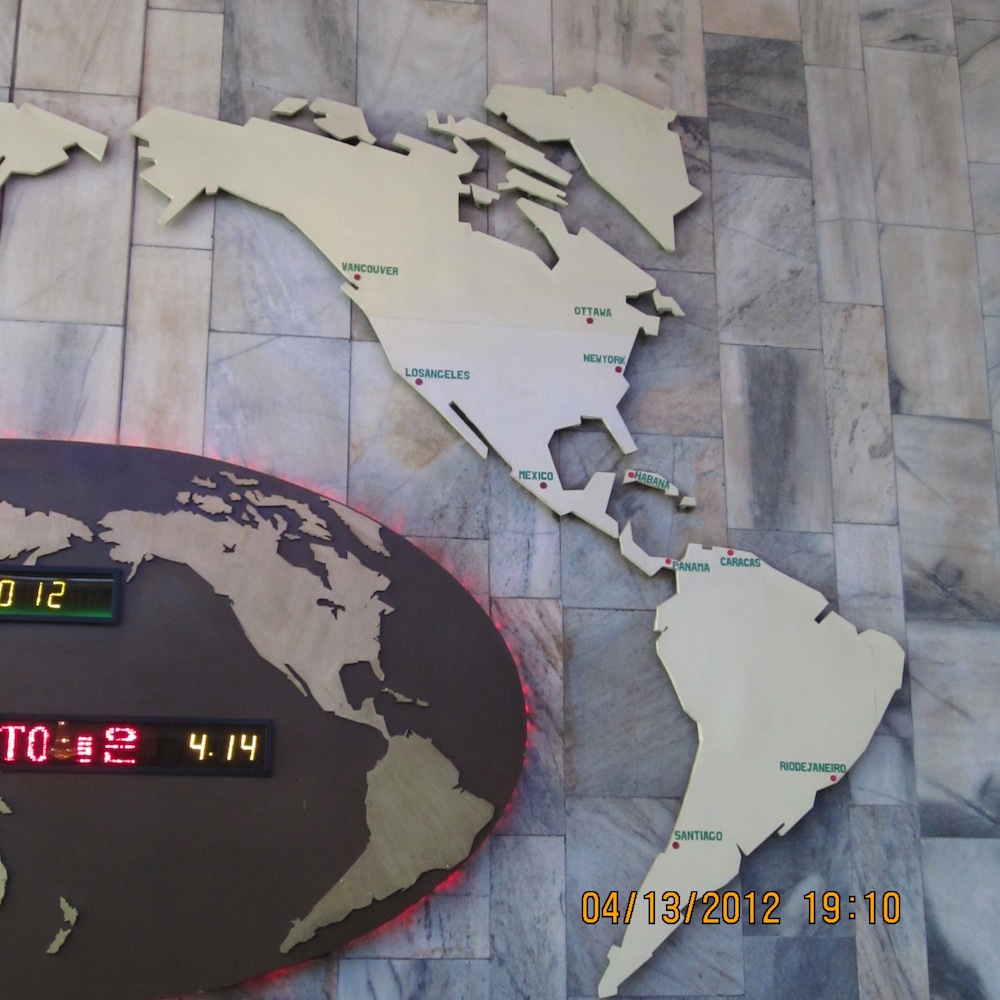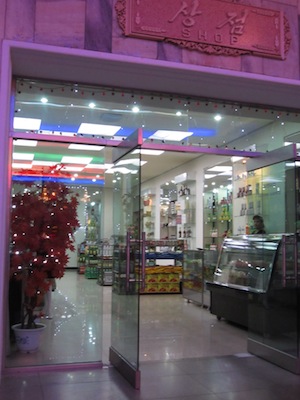This is the third post in a series about my trip to North Korea
REORIENTATION
Our first hotel in Pyongyang is a combination of Soviet realism and Vegas. Behind the over-sized reception desk hangs a cutout map. In the North Korean view of the world, Korea is enormous relative to Japan and Australia has completely disappeared. Three digital clocks display the local time in Pyongyang, Islamabad and Vladivostok. New York City has been relegated to the hinterlands.
At the other end of the lobby is the gift shop with a potted plant festooned with red flashing Christmas lights. It is relatively well stocked with Chinese-made snacks: Stereo cookies in place of Oreos and Lexus butter crackers, liquor and even some clothing. Outside of Pyongyang, the supply of goods becomes erratic, whatever can be scavenged. At our hotel in Nampho, I spot a black lace teddy for sale beside a meager assortment of postcards and CDs.


To get to our rooms, we wander down dimly lit corridors, past inexplicable spaces and lots of potted plants. It reminds me of hotels I stayed at in Ulaanbaatar where, turning a corner, I'd suddenly happen upon a complete living room set with chairs, sofa, chandelier, coffee table and ashtray.
A housekeeper helps me with my room key. I think she must be about my age, but she looks used up. I motion for her to wait, and hurry inside to unpack my suitcase half-filled with Ghirardelli chocolate bars. I give her one. At first she refuses, then finally accepts. I see her later in the hallway. She comes up to me, and smiles and strokes my shoulder and I stroke hers. In this wordless exchange, we have somehow managed to overcome decades of animosity and propaganda.
My hotel room looks like it has not been used since the 1960s. Between twin beds is a modular radio console that must have been the height of hip modernity. The floor is heated Korean style. As with everything here, I read a message into it. "They want us to know how much fuel they have," I think.
The room is stifling. I sit down on the bed, take off my shoes and turn on the T.V. It is a broadcast of a political assembly. The audience is color-coded: olive clad military personnel on one side, blue uniformed civilians on the other. At the front, two monumental alabaster statues of Kim Il Sung and Kim Jung Il stand watch over the new leader, Kim Jong Un. Sitting behind a huge podium, he looks like a bored teenager at a high-school assembly. Beside him, an older man orates vociferously. I have no idea what he is saying, but the singsong cadence is recognizable enough. Every so often, a huge wave of approval erupts from the audience. They stand and clap and cheer. The undulating roar goes on and on, I feel my eyelids closing.
EVIL IS A BABY-FACED LONER WITH BRACES
By the time I get downstairs to the dining room, most of the tables are filled. I sit with the outcasts, two very young Asian men sucking on our dinner, chicken necks floating in oil. Feeling old and left out, I gamely attempt conversation.
"Why did you come to North Korea?" It is the question we all are asking.
The man next to me says that he has come to pay his respects to the President Kim il Sung.
"Kim il Sung is the sun of mankind who shines for all peace and justice loving people around the world," he says.
It takes a minute for me to process. It's clear from his tone that he is not being ironic, even so, I can't believe he's sincere. I suddenly feel as if I'm dreaming, as if the weirdness of this place is chloroform I'm inhaling, which is just now taking effect. I ask him what he means.
He repeats his slogan word for word like a nursery rhyme. He says that even though Kim il Sung has died, he will always be the president. If we read his books, we will know what to do. When I question this, he tells me that the will of the state is paramount. Individuals who disagree should be locked up.
I shudder and ask "What about Hitler?" He speaks with admiration of the Nazi leader; I can't believe he's saying this and scurry to find some common ground.
"What about art?" I ask. "What about imagination?"
He tells me art is okay as long as it functions correctly.
"What about love?"
He asks me what that has to do with anything.
I tell him that all of these monumental ideas: justice, equality, peace are not just abstractions. Even the machines he hopes one day to design (he is studying mechanical engineering) are not abstractions because they are made for bodies to operate. Not some concept of a body, but an individual one that gets sick and feels pain. He tells me that it does not matter if one body dies. I ask him how he would feel if that body was his mother, and he admits that he would feel sad. I do not wait for him to tell me that it doesn't matter. I stand up, shaking, barely able to breathe. I call him a "creep" (a word so inadequate for the situation that, in retrospect, it seems perfect) and leave.
I have to tell someone, blood-let this poisoned conversation. I approach the next table where our Western guide, J. is eating. He looks up. He asks if I am okay.
"No, I am not okay. I've been talking to a Nazi."
Everyone turns and stares. Someone asks if I want to sit down. Someone asks if I want a beer. Someone gets a chair.
"He told me that six million Jews didn't die. He said gay people should be 'separate but equal' and that black people have lower IQs so they commit all the crimes."
"He seemed so normal in his emails," J. assures me.
Evil is a baby-faced loner with braces. Less than six hours in North Korea, I've come face to face with what I feared, and he comes from Toronto.
At the end of the meal, he comes over and offers his hand in a gesture of reconciliation. "We are just starting this trip, we will be together for nine days," he explains. I shake. A few days into the tour, he asks to sit with me on the bus. He tells me about modifications the Soviets made to their tanks in World War II. He tells me that I'm probably not interested. I fib a little and tell him I am.
"You're the only person he talks to," a fellow traveler observes.
At another meal, we argue again, but it's different. Somehow, along the way, I've developed a genuine, though uneasy fondness for him. He brings up the Buddhist tenet of nonviolence, and asks if I were attacked would I defend myself? I tell him I would, but the goal of practice would be to value my attacker's life more than my own.
"I know most people don't think this way," I say, "You don't have to agree, but you can't change my mind." He considers this. There is nothing more to say, so we sit together silently. At the end of the trip, he gives me his email so I can send him pictures.

